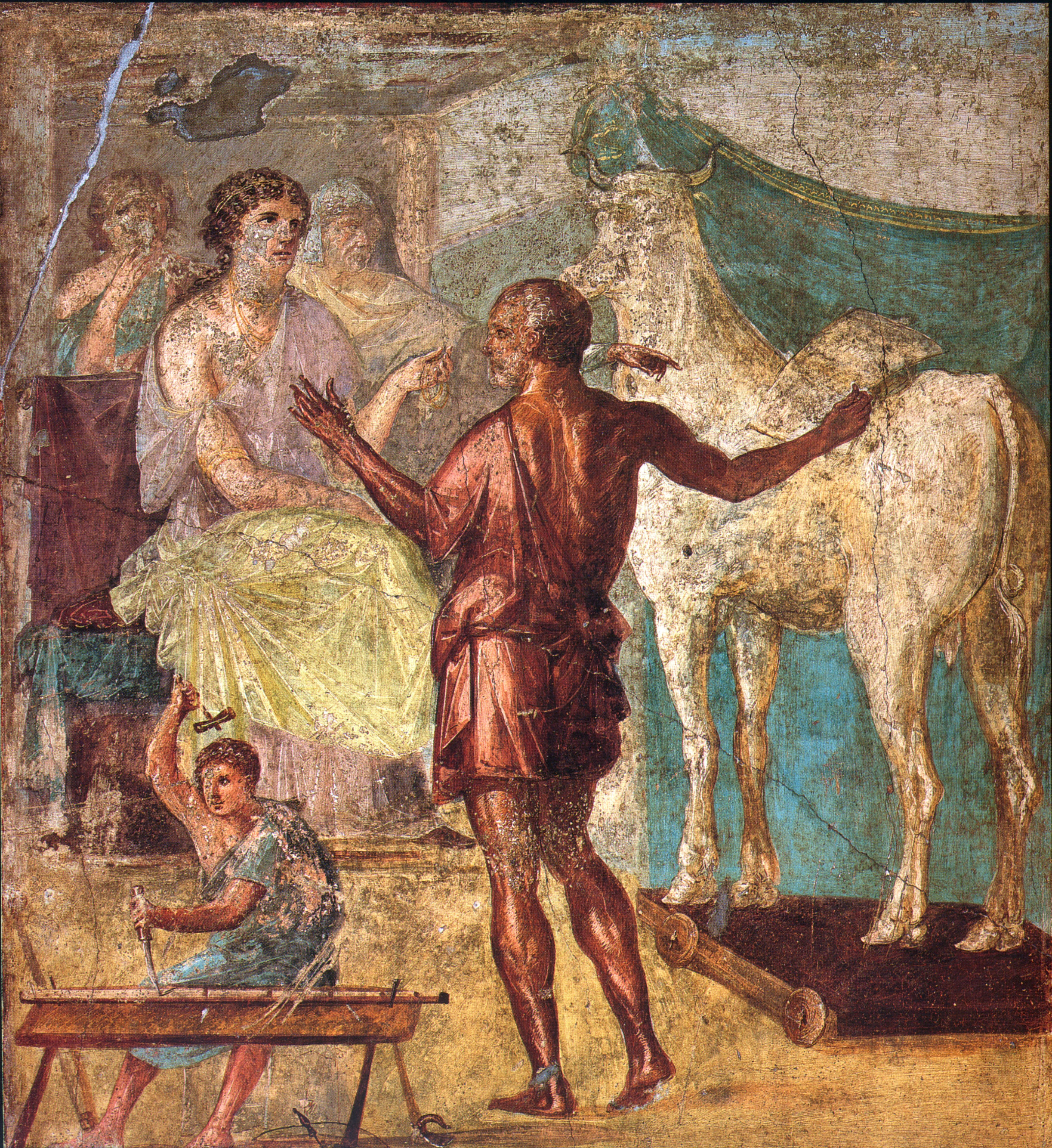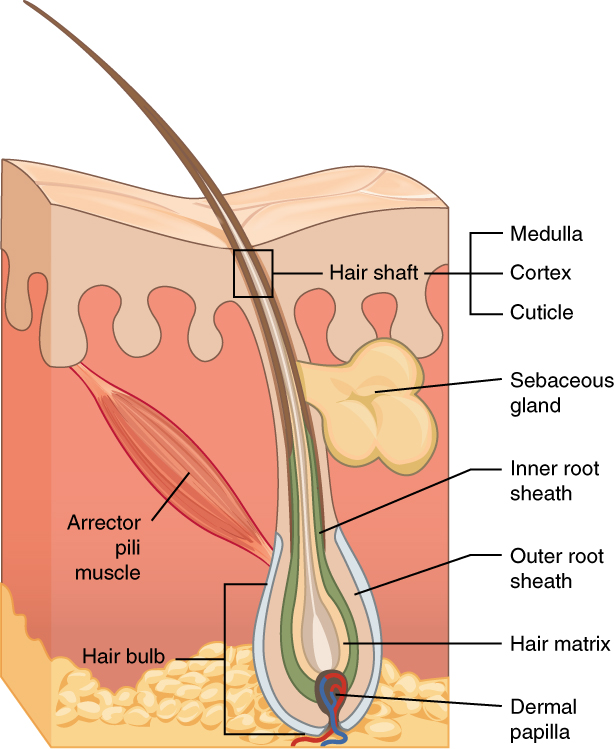|
Iphinoe (mythology)
In Greek mythology, the name Iphinoe ( grc, Ἰφινόη) may refer to: *Iphinoe, an Argive princess as one of the daughters of King Proetus and Stheneboea. She and her sisters Lysippe and Iphianassa were driven mad (either because they didn't accept the rites of Dionysus, or else because they disparaged a wooden statue of Hera) and ran off into the wilderness like maenads. Melampus had to pursue them in order to provide a cure; Iphinoe died in the pursuit, but her sisters did eventually recover their wits through purification rites. *Iphinoe, a Megarian princess as daughter of King Nisos and Abrota of Onchestus, thus sister to Eurynome and Scylla. She was the mother of Timalcus, Evippus and Evaechme by Megareus, her maternal uncle. *Iphinoe, also a Megarian princess as daughter of King Alcathous by either Pyrgo or Evaechme (daughter of the precedent). She died a maiden, and it was a custom for the girls of Megara to bring libations to her tomb and to dedicate a lock of hair to h ... [...More Info...] [...Related Items...] OR: [Wikipedia] [Google] [Baidu] |
Greek Mythology
A major branch of classical mythology, Greek mythology is the body of myths originally told by the Ancient Greece, ancient Greeks, and a genre of Ancient Greek folklore. These stories concern the Cosmogony, origin and Cosmology#Metaphysical cosmology, nature of the world, the lives and activities of List of Greek mythological figures, deities, Greek hero cult, heroes, and List of Greek mythological creatures, mythological creatures, and the origins and significance of the ancient Greeks' own cult (religious practice), cult and ritual practices. Modern scholars study the myths to shed light on the religious and political institutions of ancient Greece, and to better understand the nature of myth-making itself. The Greek myths were initially propagated in an oral tradition, oral-poetic tradition most likely by Minoan civilization, Minoan and Mycenaean Greece, Mycenaean singers starting in the 18th century BC; eventually the myths of the heroes of the Trojan War and its after ... [...More Info...] [...Related Items...] OR: [Wikipedia] [Google] [Baidu] |
Hesiod
Hesiod (; grc-gre, Ἡσίοδος ''Hēsíodos'') was an ancient Greek poet generally thought to have been active between 750 and 650 BC, around the same time as Homer. He is generally regarded by western authors as 'the first written poet in the Western tradition to regard himself as an individual persona with an active role to play in his subject.' Ancient authors credited Hesiod and Homer with establishing Greek religious customs. Modern scholars refer to him as a major source on Greek mythology, farming techniques, early economic thought, archaic Greek astronomy and ancient time-keeping. Life The dating of Hesiod's life is a contested issue in scholarly circles (''see § Dating below''). Epic narrative allowed poets like Homer no opportunity for personal revelations. However, Hesiod's extant work comprises several didactic poems in which he went out of his way to let his audience in on a few details of his life. There are three explicit references in ''Works and Days'' ... [...More Info...] [...Related Items...] OR: [Wikipedia] [Google] [Baidu] |
Metion
In Greek mythology, Metion (; Ancient Greek: Μητίων, ''gen''. Μητίονος) was an Athenian prince as the son of King Erechtheus and Praxithea, daughter of Phrasimus and Diogeneia. Family Metion was the brother of Cecrops, Pandorus, Protogeneia, Pandora, Creusa, Procris, Oreithyia and Chthonia. His other possible siblings were Merope, Orneus, Thespius, Eupalamus and Sicyon. In some account, Metion's father was Eupalamus, son of Erechtheus, instead. He had sons known collectively as the Metionadae which probably include Eupalamus, Sicyon, and Daedalus (his son by Iphinoe). These mentioned sons are sometimes credited with other parentages. Mythology The Metionids later drove King Pandion II out of Athens into exile. These usurping sons were in turn overthrown by the sons of Pandion: Aegeus, Nisus, Lycus and Pallas.Apollodorus3.15.6 Pausanias, ''Graeciae Descriptio'' 1.5.4 Notes References * Apollodorus, ''The Library'' with an English Translation by Sir Jam ... [...More Info...] [...Related Items...] OR: [Wikipedia] [Google] [Baidu] |
Daedalus
In Greek mythology, Daedalus (, ; Greek: Δαίδαλος; Latin: ''Daedalus''; Etruscan: ''Taitale'') was a skillful architect and craftsman, seen as a symbol of wisdom, knowledge and power. He is the father of Icarus, the uncle of Perdix, and possibly also the father of Iapyx. Among his most famous creations are the wooden cow for Pasiphaë, the Labyrinth for King Minos of Crete which imprisoned the Minotaur, and wings that he and his son Icarus used to escape Crete. It was during this escape that Icarus did not heed his father's warnings and flew too close to the sun; the wax holding his wings together melted and Icarus fell to his death. Epigraphic evidence The name ''Daidalos'' appears to be attested in Linear B, a writing system used to record Mycenaean Greek. The name appears in the form ''da-da-re-jo-de'', possibly referring to a sanctuary. Family Daedalus's parentage was supplied as a later addition, with various authors attributing different parents to him. His fat ... [...More Info...] [...Related Items...] OR: [Wikipedia] [Google] [Baidu] |
Hair
Hair is a protein filament that grows from follicles found in the dermis. Hair is one of the defining characteristics of mammals. The human body, apart from areas of glabrous skin, is covered in follicles which produce thick terminal and fine vellus hair. Most common interest in hair is focused on hair growth, hair types, and hair care, but hair is also an important biomaterial primarily composed of protein, notably alpha-keratin. Attitudes towards different forms of hair, such as hairstyles and hair removal, vary widely across different cultures and historical periods, but it is often used to indicate a person's personal beliefs or social position, such as their age, sex, or religion. Overview The word "hair" usually refers to two distinct structures: #the part beneath the skin, called the hair follicle, or, when pulled from the skin, the bulb or root. This organ is located in the dermis and maintains stem cells, which not only re-grow the hair after it falls out, b ... [...More Info...] [...Related Items...] OR: [Wikipedia] [Google] [Baidu] |
Pyrgo (mythology)
In Greek mythology, Pyrgo (Ancient Greek: Πυργώ) was the first wife of the Pisatian prince Alcathous, son of King Pelops of Pisa and Hippodamia, daughter of Oenomaus. She may be the mother of some or all of Alcathous children: Ischepolis, Callipolis, IphinoePausanias, ''Graeciae Descriptio'' 1.43.4 and Periboea.Pausanias, ''Graeciae Descriptio'' 1.42.2 & 4 Otherwise, they were by Alcathous' second wife, Euaechme, daughter of King Megareus of Megara. Notes References * Pausanias, ''Description of Greece'' with an English Translation by W.H.S. Jones, Litt.D., and H.A. Ormerod, M.A., in 4 Volumes. Cambridge, MA, Harvard University Press; London, William Heinemann Ltd. 1918. Online version at the Perseus Digital Library* Pausanias, ''Graeciae Descriptio.'' ''3 vols''. Leipzig, Teubner. 1903.Greek text available at the Perseus Digital Library * Pseudo-Apollodorus The ''Bibliotheca'' (Ancient Greek: grc, Βιβλιοθήκη, lit=Library, translit=Bibliothēkē, label= ... [...More Info...] [...Related Items...] OR: [Wikipedia] [Google] [Baidu] |
Alcathous Of Megara
Alcathous (; grc, Ἀλκάθοος) was in Greek mythology, a Pisatian prince who became a king of Megara. He was the son of King Pelops of Pisa and Hippodamia, and brother of Atreus and Thyestes. He first married Pyrgo and afterwards Euaechme, and was the father of Ischepolis (), Callipolis (), Iphinoe, Periboea, and Automedusa. Mythology Pausanias relates that after Euippus, son of king Megareus, was killed by the Lion of Cithaeron, Megareus, whose elder son Timalcus had likewise fallen by the hands of Theseus, offered his daughter Euaechme and his kingdom to anyone who could slay the lion. Alcathous undertook the task, killed the lion, and thus obtained Euaechme for his wife, and afterwards became the successor of Megareus. In gratitude for this success, he built at Megara a temple of Artemis Agrotera and Apollo Agraeus. He also restored the walls of Megara, which had been destroyed by the Cretans. In this work he was said to have been assisted by Apollo, and the sto ... [...More Info...] [...Related Items...] OR: [Wikipedia] [Google] [Baidu] |
Pausanias (geographer)
Pausanias ( /pɔːˈseɪniəs/; grc-gre, Παυσανίας; c. 110 – c. 180) was a Greek traveler and geographer of the second century AD. He is famous for his ''Description of Greece'' (, ), a lengthy work that describes ancient Greece from his firsthand observations. ''Description of Greece'' provides crucial information for making links between classical literature and modern archaeology. Biography Not much is known about Pausanias apart from what historians can piece together from his own writing. However, it is mostly certain that he was born c. 110 AD into a Greek family and was probably a native of Lydia in Asia Minor. From c. 150 until his death in 180, Pausanias travelled through the mainland of Greece, writing about various monuments, sacred spaces, and significant geographical sites along the way. In writing ''Description of Greece'', Pausanias sought to put together a lasting written account of "all things Greek", or ''panta ta hellenika''. Living in t ... [...More Info...] [...Related Items...] OR: [Wikipedia] [Google] [Baidu] |
Megareus Of Onchestus
In Greek mythology, Megareus (Ancient Greek: Μεγαρεύς) may refer to: *Megareus, king of Onchestus in Boeotia and father of Hippomenes. *Megareus, son of Eurydice of Thebes, and a defender of Thebes during the war of the Seven against Thebes. Notes References * Aeschylus, translated in two volumes. 1. ''Seven Against Thebes'' by Herbert Weir Smyth, Ph. D. Cambridge, MA. Harvard University Press. 1926Online version at the Perseus Digital Library. * Gaius Julius Hyginus
Gaius Julius Hyginus (; 64 BC – AD 17) was a Latin author, a pupil of the scholar Alexander Polyhistor, and a freedman of ...
[...More Info...] [...Related Items...] OR: [Wikipedia] [Google] [Baidu] |
Evaechme
In Greek mythology, the name Evaechme, Euaechme or Euaichme (Ancient Greek: Εὐαίχμη) may refer to: *Evaechme, a Megarian princess as daughter of King Megareus and Iphinoe, daughter of King Nisus, thus sister of Evippus and Timalcus. She was the second wife of Alcathous, son of Pelops and by him, became the mother of Ischepolis, Callipolis, Iphinoe and Periboea. Otherwise, the mother of these children was Pyrgo.Pausanias, 1.43.4 *Evaechme, daughter of Hyllus and Iole, wife of Polycaon, the son of the Argonaut Butes.Pausanias4.2.1with a reference to the ''Megalai Ehoiai'' Notes References * Pausanias Pausanias ( el, Παυσανίας) may refer to: *Pausanias of Athens, lover of the poet Agathon and a character in Plato's ''Symposium'' *Pausanias the Regent, Spartan general and regent of the 5th century BC *Pausanias of Sicily, physician of th ..., ''Description of Greece'' with an English Translation by W.H.S. Jones, Litt.D., and H.A. Ormerod, M.A., in 4 Volumes. ... [...More Info...] [...Related Items...] OR: [Wikipedia] [Google] [Baidu] |
Evippus
In Greek mythology, the name Evippus or Euippos ( grc, Εὔιππος, meaning "having good horses") may refer to: *Evippus, a Pleuronian prince as the son of King Thestius and Eurythemis, daughter of Cleoboea. He was the brother of Althaea, Leda, Hypermnestra, Iphiclus, Plexippus and Eurypylus. Evippus might have been killed by his nephew Meleager during the war of the Curetes and the Calydonians. *Evippus, a Lycian who was killed by Patroclus in the Trojan War. *Evippus, a son of Megareus and Iphinoe, brother of Timalcus and Euaechme. He was killed by the Cithaeronian lion. *Evippus, an Arcadian hero. On the wedding day of Adrastus' daughters, his shield fell off the highest summit of the temple of Athena, which was a sign of bad luck in the future.Statius, ''Thebaid'' 2.258 Notes References * Homer, ''The Iliad'' with an English Translation by A.T. Murray, Ph.D. in two volumes. Cambridge, MA., Harvard University Press; London, William Heinemann, Ltd. 1924. Online ve ... [...More Info...] [...Related Items...] OR: [Wikipedia] [Google] [Baidu] |



